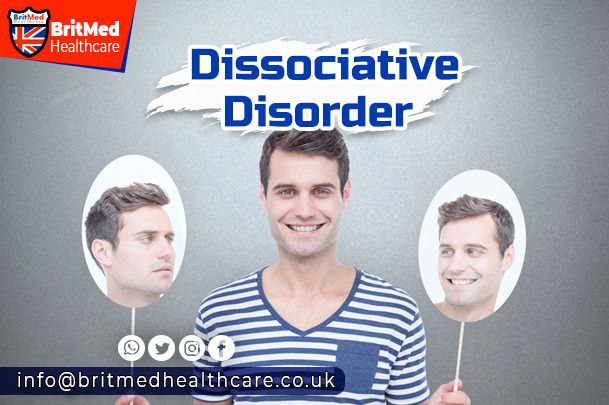Dissociative Disorder: Etiology, Manifestations, and Therapeutic Approaches
Dissociative diseases encompass a group of mental illnesses in which individuals
detach themselves from their thoughts, memories, and sense of self. These instances
can be challenging to manage; nevertheless, cognitive behavior therapy can be highly
efficacious in treating them.
Dissociative Disorder is a psychological condition characterized by a disruption in a
person normal integration of thoughts, feelings, and identity.
Dissociative disorder is an umbrella term including several mental health issues that
result in a separation or detachment from one thoughts, memories, or sense of
identity.
Here are several examples:
• Dissociative amnesia refers to the condition in which an individual feels a loss of
memory for significant events or experiences.
• Dissociative identity disorder is a condition characterized by the presence of two or
more separate personalities within one individual, each with its own unique way of
perceiving and reacting to the world.
• Depersonalization disorder is characterized by an experience of detachment from
one thoughts and feelings.
• Dissociative disorder not otherwise specified (DD-NOS): This diagnosis is used
when a person has symptoms of depersonalization that do not fit into any other specific
category of dissociative disorders.
Factors contributing to the development of dissociative disorders
Dissociative disorders are characterized by their intricate and multidimensional nature.
Several potential causes include:
Psychological trauma or chronic stress: Experiencing traumatic events or enduring
ongoing stressors can result in an individual being detached and socially isolated.
Genetic propensity: Certain individuals may have a genetic predisposition that
increases their susceptibility to developing dissociative illnesses.
Imbalances in brain chemistry, specifically with neurotransmitters like serotonin or
dopamine, can heighten the likelihood of developing dissociative disorders.
Manifestations of Dissociative Disorders
The symptoms of dissociative disorders can vary greatly depending on the exact
disorder and the individual, although there are some common general symptoms:
– A feeling of detachment from one own identity
– A perception of detachment from one physical self
– A fragmented perspective or understanding of the world
– Sensation of living in a state of unreality or imagination
– Physical symptoms such as lack of sensation, tingling, or discomfort Treatments form Dissociative Disorders
Treatment for dissociative disorders encompasses various strategies,
which include the following:
Cognitive behavioral therapy (CBT) is a therapeutic approach facilitated by
professionals to assist individuals in recognizing and confronting problematic thought
patterns.
Medication: Therapy may provide prescriptions for medication that can assist in
managing the symptoms.
Support groups provide individuals with an opportunity to establish connections and
get a deeper knowledge of their experiences.
The process involves engaging in dialogue with a therapist to ascertain the
fundamental causes of the disorder.
Cognitive Behavioral Therapy (CBT) for Dissociative Disorders Cognitive Behavioral
Therapy (CBT) is a psychotherapy method that has been empirically validated for its
efficacy in addressing dissociative disorders.
Key details of Cognitive Behavioral Therapy (CBT): It allows individuals to identify
and control different negative thinking patterns, develop new and positive coping and
thinking abilities, enhance self-awareness and self-acceptance, and improve
interpersonal connections.
Cognitive Behavioral Therapy (CBT), however, operates on the premise that ideas,
emotions, and actions are interconnected. Altering unfavorable thought patterns has a
direct impact on the emotional equilibrium and subsequent actions of individuals. CBT
can be beneficial in addressing symptoms and negative cognitive patterns that
contribute to the maintenance of dissociative disorders.
In conclusion
Dissociative disorders are intricate and multifaceted illnesses that pose a significant
barrier in terms of therapy. Nevertheless, with appropriate medical intervention, these
symptoms can be managed to some degree.
Hashtags:
#dissociatedisorders
#mentalhealth
#trauma
#stress
#cognitivebehavioraltherapy
#psychotherapy
#supportgroups
Websites:
For more information on dissociative disorders and treatment options, please visit Britmed
Healthcare at https://britmedhealthcare.co.uk/blog/.
Book a consultation with Professor Ahmed El-Missiry at
https://www.nightingalehospital.co.uk/specialist/prof-ahmed-elmissiry/.




